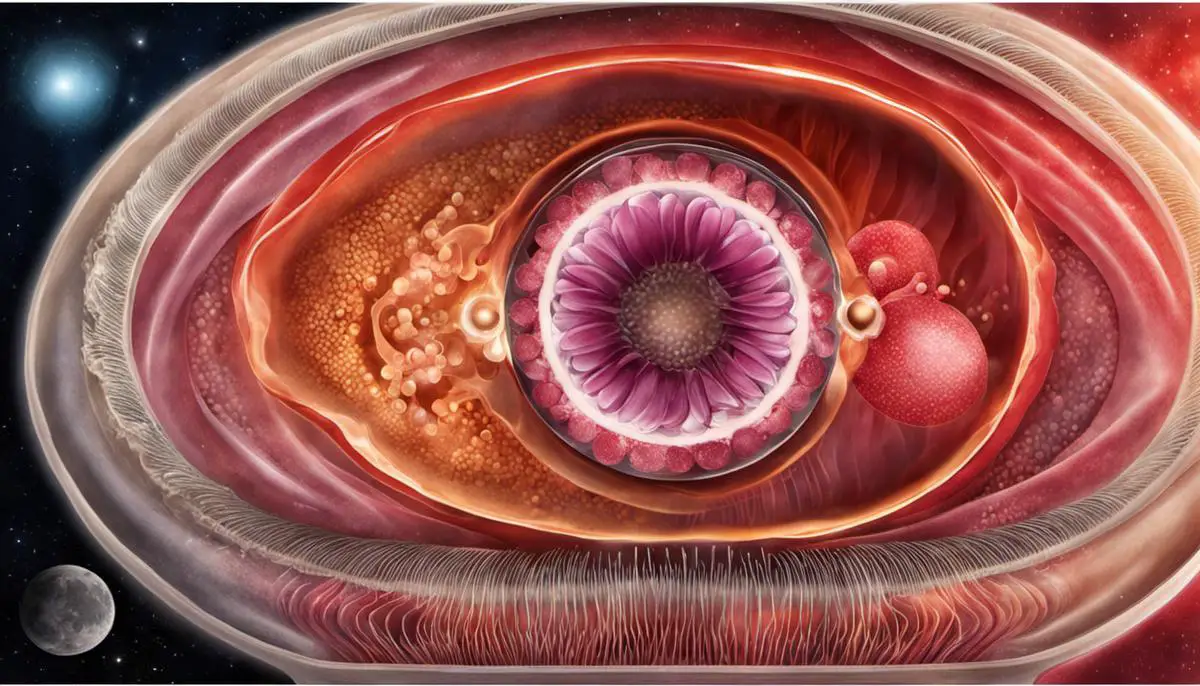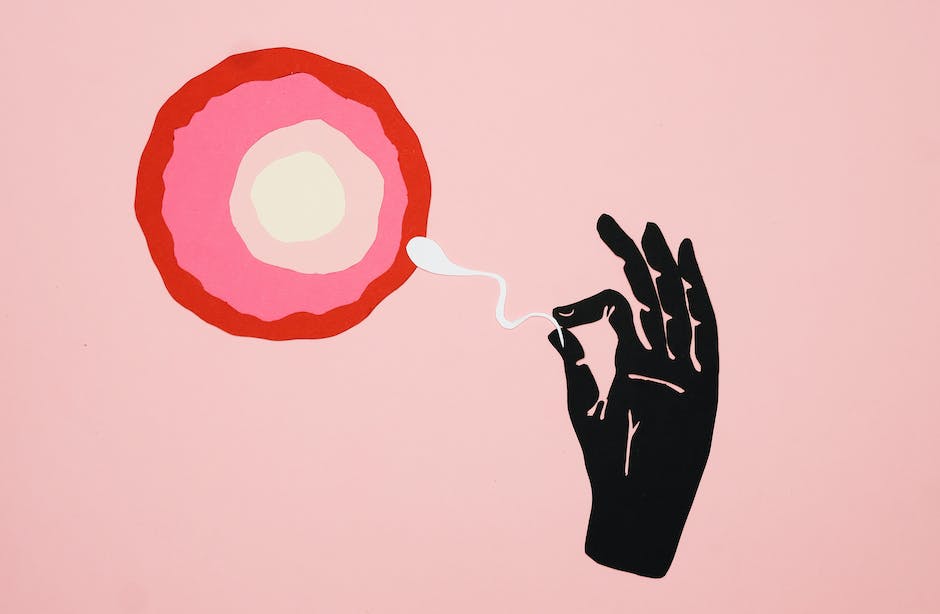Last Updated On February 13, 2024
Navigating the nuances of female fertility can often seem complex and overwhelming due to the numerous interconnecting facets involved. Often, questions such as these emerge:
- Can one get pregnant without a period?
- What is the relationship between ovulation and menstruation?
- Is it possible to ovulate without noticeable signs?
The following discourse will delve into these topics, helping to demystify the intricate network of female reproductive health. By understanding the menstrual cycle and its phases, exploring the possibility of silent or no ovulation, debunking myths about pregnancy without a period, and discussing the ties between irregular periods and infertility, we strive to shed clarity on these pertinent concerns.

PICKS: How coconut water can affect Ovulation: Benefits and Risks
Understanding Your Menstrual Cycle
Understanding Your Menstrual Cycle: Ovulation and Menstruation
The menstrual cycle is a natural process that female bodies navigate each month, and it plays a crucial role in fertility. This cycle, which typically lasts between 21 to 35 days, is divided into four main phases: menstruation, the follicular phase, ovulation, and the luteal phase.
Menstruation begins on the first day of your period, sheds the lining of the uterus, and normally lasts between three and seven days. The follicular phase, overlapping with menstruation, involves the maturation of several ovarian follicles stimulated by the pituitary hormone, follicle-stimulating hormone (FSH). This phase includes the body gearing up to release a new egg or ovum.
Ovulation, occurring mid-cycle around day 14 in a 28-day cycle, is when a mature egg is released from the ovary, triggered by a surge in luteinizing hormone (LH). The released egg travels down the fallopian tube, ready to be fertilized by a sperm. The final phase, the luteal phase, is marked by the development of the corpus luteum and increased secretion of progesterone, preparing the uterus for the potential implantation of a fertilized egg.
PICKS:
- Try Yaupon Tea: A Natural Fertility and Brain Booster
- Seed Cycling for Fertility: A Natural Approach, Benefits & Side Effects
- Top 4 seeds for female fertility: How to use them for seed cycling
Pregnancy Without a Period: How is it Possible?
Understanding the ovarian cycle is key to answering the question, “Can you get pregnant without a period?” Technically, the answer is yes. Ovulation, not menstruation, is the phase of the menstrual cycle necessary for pregnancy. It is during ovulation that an egg is released, and if it meets with a sperm, fertilization and subsequently pregnancy occur.
Menstruation occurs when a woman is not pregnant and is a sign that she has ovulated. However, some women may ovulate without having a period. This is often true for women with irregular periods or conditions like Polycystic Ovary Syndrome (PCOS), where women may not have a period for months and then ovulate, or have light periods or spotting that might be missed for a regular period.
It is also important to note that cycles without ovulation (anovulatory cycles) are common and normal in many stages of a woman’s reproductive life, such as adolescence, breastfeeding, and perimenopause, the transition period to menopause.
The Connection Between Menstruation and Fertility
Commonly, a regular menstrual cycle is viewed as an indicator of fertility. Regular periods typically imply that a woman is ovulating regularly – the time when conception can happen. On the other hand, irregular menstrual cycles can make predicting ovulation more complex and may need extra fertility awareness strategies.
To summarize, even though it is possible to get pregnant without having a period, regular menstrual cycles usually indicate regular ovulation. This increases the predictability of fertile periods and the likelihood of conception. It’s imperative to seek advice from healthcare professionals if you’re considering pregnancy and experiencing irregular periods, as this could be a sign of potential health issues affecting fertility.

Ovulation without a Period: Is it Possible?
The Possibility of Ovulation Without Menstruation
Ovulation without menstruation is a less common but possible scenario. This contributes to the discussion about getting pregnant without a period. The menstrual cycle consists of two key phases: the ovulation phase when an egg is produced and released by the ovary, and the menstrual phase when the uterus sheds its lining. While these two phases are usually linked, there are instances where a woman can still ovulate without undergoing a period or have a period without ovulating
Understanding the Link between Ovulation and Menstruation
In the typical 28-day menstrual cycle of an average woman, ovulation usually happens around the 14th day. This is when the ovary releases a mature egg for fertilization. If, following ovulation, the egg does not encounter a sperm for fertilization, the uterine lining sheds, marking the start of the menstrual period. This is seen as a confirmation that no pregnancy occurred during that cycle. However, it’s also important to understand that a woman can have her period without ovulation. This non-ovulatory cycle turns the period into anovulatory bleeding.
Instances of Anovulation and Silent Ovulation
Conditions that may lead to anovulation or silent ovulation range from hormonal imbalances to lifestyle factors or the onset of menopause. Sometimes, stress, excessive exercise, or sudden weight changes can profoundly affect the regularity of the menstrual cycle and ovulation process.
Silent ovulation is a condition where a woman ovulates without the common symptoms associated with ovulation, such as increased libido and mid-cycle pain. This absence of symptoms makes it challenging for a woman to tell when she is ovulating, leading to the misconception that she could be pregnant without a period.
Can You Get Pregnant Without Having a Period?
The possibility of becoming pregnant without having a period is theoretically feasible, given that ovulation is still taking place. During ovulation, an egg is released and can be fertilized within the short window of 12 to 24 hours, allowing for the potential of pregnancy even before the onset of the next menstrual cycle.
However, it’s worth noting that this occurrence carries a level of uncertainty. A cycle without menstruation commonly indicates a lack of ovulation, thereby lessening the likelihood of pregnancy. Yet, due to certain situations like silent ovulation or irregular cycles, becoming pregnant without a period isn’t entirely impossible. Furthermore, if a woman consistently experiences regular periods but then misses several, this could potentially be an early sign of pregnancy.
In sum, the prospect of getting pregnant without a period isn’t the norm, but also not inconceivable. As long as a woman undergoes ovulation – whether or not that’s in line with a regular menstrual cycle – there remains a potential for pregnancy. Keep in mind, though, that a woman’s body can react differently due to several influential factors.

Getting Pregnant without a Period: Facts and Myths
Decoding the Relationship Between Menstrual Cycles and Fertility
A menstrual cycle is usually marked as starting on the first day of a period, the phase where the uterus sheds the lining that has been built up in preparation for a potential pregnancy. This cycle ends just before the onset of the subsequent period. The predominant stages of a menstrual cycle include menstruation, the follicular phase (preparation for ovulation), ovulation, and the luteal phase (preparation of the uterus for potential pregnancy). Ovulation typically transpires around the midpoint of the cycle, wherein an egg is released from the ovaries. This period represents the optimal time for conception to take place.
Can You Get Pregnant Without a Period?
It is essential to clarify that ovulation precedes the menstrual period in the cycle. Thus, technically, a woman can become pregnant before having their first post-puberty period or between periods after childbirth or breastfeeding. The egg released during ovulation can be fertilized if sperm is present.
Irregular or Infrequent Periods and Fertility
Some women may not have their periods due to various conditions such as Polycystic Ovary Syndrome (PCOS), a condition that may be improved using medicinal plants such as Licorice root, Cinnamon, Ashwagandha, Dong Quai, Turmeric, Vitex, and Ginger. Stress, excessive exercise, or certain medications are also conditions that might affect the regularity of ovulation and therefore complicate the predictability of their fertile window. However, ovulation could still occur, and pregnancy is possible if it coincides with sexual intercourse. Hence, even if your periods are irregular or infrequent, there’s still a chance you can get pregnant.
Post-partum Period and Fertility
In the case of women who have recently given birth, it’s possible to conceive without having a period. Breastfeeding may delay the return of menstruation, but it doesn’t prevent ovulation. Thus, theoretically, a woman could become pregnant just weeks after delivery even before her menstruation resumes.
Menopause and Fertility
During perimenopause, the transition phase to menopause, periods may become irregular but ovulation can still occur sporadically. Hence, there remains a small window of fertility where pregnancy may still be possible. Once a woman has reached menopause and hasn’t had a period for a full year, she is no longer able to conceive naturally.
Debunking Conception Misconceptions
The prevailing notion that pregnancy is impossible without menstruation is not quite accurate. The key process for conception is ovulation, not menstruation. It’s also common to falsely presume that breastfeeding or menopause offers immediate protection against pregnancy. Understanding fertility and ovulation involves a multifaceted interplay of factors, highly individualized and best addressed with expert guidance. It is recommended to engage with a healthcare provider for accurate information about your fertility and potential conception probabilities.

Infertility and Irregular Periods: What You Need to Know
A Closer Look at Infertility and Irregular Menstrual Cycles
Infertility is defined as the inability to conceive after having regular, unprotected intercourse for a year or longer. One of the factors contributing to infertility can be irregular or absent periods, also known as anovulatory cycles. Irregular menstrual cycles are instances where the length of the cycle vastly differs each month, either shorter than 21 days or longer than 35 days. Absent periods for many months or more are known as amenorrhea. Both these conditions could point towards underlying fertility issues.
The Link Between Anovulation and Infertility
Anovulation refers to a menstrual cycle in which the ovary does not release an egg. This is crucial to remember because a woman can still have a period without ovulation, but getting pregnant without the release of an egg is impossible. Thus, consistent anovulation can seriously hamper attempts to become pregnant.
Anovulation is often a symptom of conditions like polycystic ovary syndrome (PCOS), premature ovarian failure, and certain metabolic disorders. It can also result from stress, extensive weight loss or weight gain, and intense physical activity. The feature common to these conditions is an imbalance in the hormonal system, notably hormones that control ovulation.
Getting Pregnant Without A Period
The consensus amongst medical professionals is that it’s highly unlikely for a woman to become pregnant without a period because ovulation precedes menstruation. If a woman isn’t ovulating, she won’t menstruate and won’t be able to conceive naturally. However, in rare cases, women with extremely irregular cycles may confuse breakthrough bleeding with actual menstruation and have managed to conceive during these irregular cycles.
Treatment and Interventions for Irregular Periods
To address infertility associated with anovulation, various treatments and interventions have been developed. Doctors may recommend lifestyle modifications intended to prompt regular ovulation. These modifications might include a balanced diet, regular exercise, stress reduction techniques, weight control, and stopping habits that can negatively impact fertility like smoking and heavy drinking.
Additionally, medical treatments including fertility drugs that might stimulate ovulation, like Clomid or Femara, can be used. In more severe cases, assisted reproductive technologies, such as in vitro fertilization, might be recommended.
In vitro fertilization (IVF) involves hormonal stimulation of the ovaries to produce multiple eggs, which are then extracted, and fertilized in a lab, and the resulting embryos transferred back to the uterus.
Remember, while the chances of getting pregnant with irregular cycles might be lower, it is not impossible, and with the aid of medical interventions, many women with irregular periods have been able to conceive.

Final thought
It is certainly evident that menstruation and fertility are closely linked, yet exceptions can occur due to factors like silent ovulation or anovulation. It is indeed possible to get pregnant even without a period, negating popular myths. However, irregular periods or lack of ovulation are often signs of underlying medical conditions that can impact an individual’s fertility. Through the exploration of treatments and interventions, we get a glimpse of the options available for individuals striving for pregnancy. Hence, it is crucial to stay informed and consult healthcare professionals when needed, keeping an open dialogue about questions and concerns to ensure optimal reproductive health.
Discover more from Fertilitylens
Subscribe to get the latest posts sent to your email.










